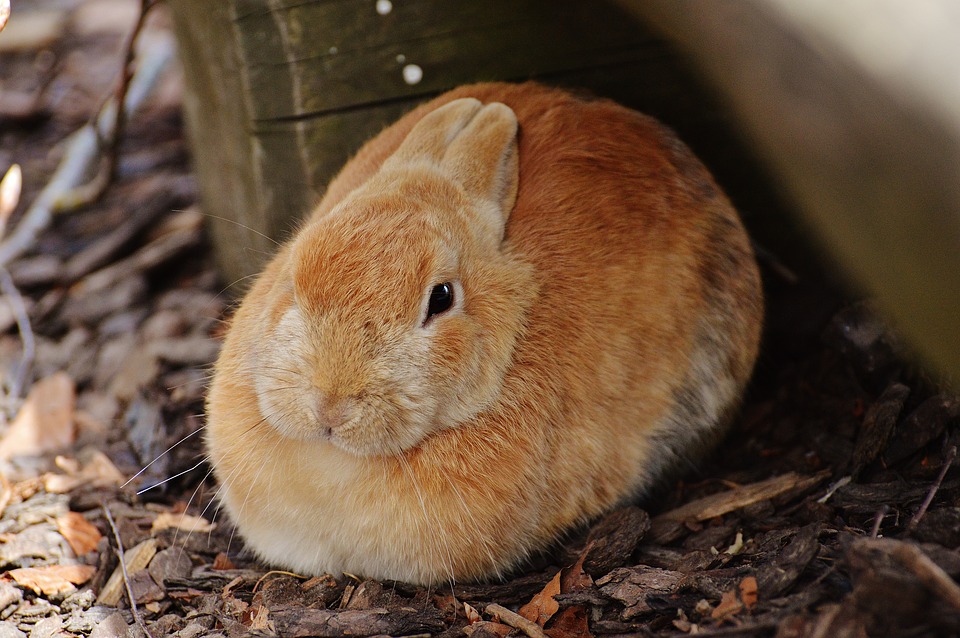This article dives deep into the fascinating world of rabbit nutrition, clearing up the misconception of them being omnivores and exploring the intricate details of their dietary needs. We'll examine their natural eating habits, essential nutrients, and the potential dangers of feeding them inappropriate foods. Discover the truth behind what rabbits truly consume and learn how to provide them with a healthy and balanced diet that promotes longevity and well-being.
Part 1: Debunking the Omnivore Myth: Unveiling the Herbivore Truth

1.1 The Herbivore Truth: A Digestive System Designed for Plants
Contrary to popular belief, rabbits are not omnivores. They are classified as strict herbivores, meaning their digestive system has evolved specifically to break down and extract nutrients from plant matter. Their bodies are not equipped to process meat or other animal products, making them entirely reliant on a plant-based diet.
1.2 The Importance of Fibre: Fueling a Healthy Digestive System
Dietary fibre is not just a crucial component of a rabbit's diet; it's the foundation. It plays a vital role in several key functions:
- Maintaining a Healthy Gut Microbiome: Fibre acts as a prebiotic, promoting the growth of beneficial bacteria in the gut, which are essential for digestion and overall health.
- Promoting Regular Bowel Movements: Adequate fibre ensures smooth passage of food through the digestive tract, preventing constipation and other digestive issues.
- Preventing Dental Problems: Constant chewing on fibrous hay helps wear down their continuously growing teeth, preventing overgrowth and associated dental problems.
- Supporting Overall Digestive Health: Fibre aids in efficient nutrient absorption and helps maintain a healthy gut environment, reducing the risk of digestive disorders.
1.3 The Fascinating Process of Caecotrophy: Recycling Nutrients for Maximum Benefit
Rabbits engage in a unique process called caecotrophy, a behaviour that further highlights their herbivorous nature. They produce soft, nutrient-rich faeces called caecotrophs, which they re-ingest directly from their anus. This behaviour allows them to absorb essential nutrients and vitamins that were initially missed during the first digestion, maximizing nutrient utilization.
Part 2: The Essential Rabbit Diet: Building a Foundation for Health

2.1 Unlimited Hay: The Cornerstone of a Healthy Diet
Hay is not just a food source for rabbits; it's the cornerstone of their diet. Offering unlimited access to high-quality hay ensures they get the necessary fibre for optimal digestion, dental health, and overall well-being. Suitable options include:
- Timothy Hay: A popular choice known for its low calorie content and high fibre content, making it ideal for adult rabbits.
- Meadow Hay: A mix of various grasses offering a wider range of nutrients and flavour.
- Oat Hay: A slightly higher-calorie option that can be offered in moderation, particularly to growing rabbits or those with higher energy needs.
2.2 Fresh Vegetables: Adding Variety and Essential Nutrients
While hay forms the base, fresh vegetables provide vital vitamins, minerals, and hydration. Offer a variety of options to cater to their nutritional needs and preferences:
- Leafy Greens: Kale, spinach, romaine lettuce, and other leafy greens provide a wealth of vitamins and minerals.
- Root Vegetables: Carrots, parsnips, and beets offer a different texture and flavour, providing important vitamins and minerals.
- Bell Peppers: Red, yellow, and orange bell peppers are a good source of vitamin C and antioxidants.
- Cucumber: A refreshing and hydrating option that can be offered in moderation.
2.3 Limited Pellets: A Supplement, Not a Staple
Pellets should be offered in moderation as a supplement to hay and fresh vegetables, not as the primary food source. Choose high-quality, timothy hay-based pellets, avoiding those containing artificial colours, flavours, or high sugar content.
- High-Quality Pellets: Look for pellets formulated specifically for rabbits, with timothy hay as the primary ingredient, and minimal added sugars or artificial ingredients.
- Portion Control: The amount of pellets offered should be based on the rabbit's age, size, and activity level, typically a small handful per day for an adult rabbit.
2.4 Fresh Water: The Essential Fluid for Hydration
Rabbits require constant access to fresh, clean water. Offer it in a heavy, stable bowl or a sipper bottle, ensuring it's easily accessible and changed regularly.
Part 3: Foods to Avoid: Protecting Your Rabbit from Harm
3.1 Toxic Foods: A List of Dangerous Ingredients
Certain foods are highly toxic to rabbits and should be strictly avoided. It's crucial to be aware of these potential threats:
- Chocolate: Contains theobromine, a compound toxic to rabbits that can cause severe health problems.
- Avocado: Contains persin, a toxin that can cause heart and respiratory problems.
- Onions and Garlic: Contain organosulfur compounds that can damage red blood cells.
- Alcohol: Toxic to rabbits and can cause severe liver damage.
- Rhubarb: Contains oxalic acid, which can cause kidney problems.
- Potatoes: The green parts and sprouts of potatoes contain solanine, a toxic compound.
3.2 Sugary Treats: The Hidden Dangers of Indulgence
Sugary treats, such as sweets, cakes, bread, and processed snacks, are detrimental to a rabbit's health. They can lead to:
- Dental Problems: Sugary treats can contribute to dental problems by promoting plaque buildup and tooth decay.
- Obesity: Excessive sugar intake can lead to weight gain and obesity, increasing the risk of health complications.
- Digestive Issues: Sugary treats can upset the delicate balance of a rabbit's digestive system, leading to diarrhoea, gas, and other digestive problems.
3.3 Human Food: A Potential Source of Trouble
While some human foods may seem harmless, it's best to avoid offering them to rabbits due to their high sodium, fat, and sugar content. These ingredients can disrupt their delicate digestive system and contribute to health problems.
Part 4: Understanding Rabbit Dietary Needs: Adapting to Age, Breed, and Activity
4.1 Age and Life Stage: Dietary Needs Evolve Through Time
Dietary requirements vary significantly based on the rabbit's age and life stage.
- Young Rabbits (under 6 months): Need a higher protein content to support growth and development.
- Adult Rabbits (6 months to 5 years): Require a balanced diet with adequate fibre for optimal health and digestion.
- Senior Rabbits (over 5 years): May benefit from a slightly lower-calorie diet with less protein and more fibre, as their metabolism slows down.
4.2 Breed and Activity Level: Tailoring the Diet to Individual Needs
Different rabbit breeds may have slightly different dietary needs.
- Active Rabbits: Require more calories and nutrients to fuel their energy levels and support their activity.
- Sedentary Rabbits: May need a slightly lower-calorie diet to prevent weight gain.
4.3 Individual Variations: Recognizing Unique Preferences and Sensitivities
Every rabbit has its own unique preferences and sensitivities. Observing your rabbit's eating habits, preferences, and any potential signs of digestive issues can help you adjust their diet accordingly.
Part 5: Ensuring a Balanced Diet: Creating a Healthy Lifestyle
5.1 Portion Control: The Key to Avoiding Overfeeding
Excessive amounts of any food can lead to health problems.
- Hay: Unlimited access to hay is encouraged.
- Vegetables: Offer a variety of vegetables in moderation, adjusting the amount based on individual needs.
- Pellets: Limit the amount of pellets offered to a small handful per day for an adult rabbit.
5.2 Dietary Variety: Promoting a Balanced Nutrient Intake
Introduce a variety of fresh vegetables and hay types to ensure your rabbit receives a balanced diet.
- Hay: Rotate between different types of hay to provide a diverse range of nutrients.
- Vegetables: Offer a wide selection of vegetables, including leafy greens, root vegetables, and bell peppers.
5.3 Gradual Changes: Introducing New Foods Safely
Introduce new foods slowly, observing for any adverse reactions. This helps ensure their digestive system can adapt to new foods and minimizes the risk of digestive upset.
Part 6: Common Dietary Mistakes: Avoiding the Pitfalls of Misinformation
6.1 Overfeeding Pellets: A Common Pitfall
Overfeeding pellets can lead to obesity, dental problems, and digestive issues. Pellets should be a supplement, not a staple, of a rabbit's diet.
6.2 Ignoring Hay: A Crucial Foundation
Hay is a crucial part of a rabbit's diet and should always be available. It provides essential fibre for digestion and dental health.
6.3 Offering Treats Regularly: Moderation is Key
Treats should be offered sparingly and in moderation. Too many treats can lead to weight gain, dental problems, and digestive issues.
Part 7: The Importance of Dental Health: A Vital Component of Rabbit Care
7.1 Continuously Growing Teeth: A Unique Challenge
Rabbits have continuously growing teeth that need to be worn down through chewing. This constant growth makes dental health a critical aspect of their well-being.
7.2 The Role of Hay: Nature's Dental Tool
Hay provides the necessary abrasion to keep teeth at a healthy length. The constant chewing action on fibrous hay helps wear down their teeth, preventing overgrowth.
7.3 Dental Problems: Addressing Overgrown Teeth
Overgrown teeth can lead to pain, difficulty eating, and other health complications. If you notice any signs of dental problems, such as difficulty eating, drooling, or weight loss, consult with a veterinarian.
Part 8: FAQs: Addressing Common Questions
8.1 Are carrots good for rabbits?
Carrots are a healthy treat but should be offered in moderation. They are high in sugar and can contribute to dental problems if consumed excessively.
8.2 Can rabbits eat fruit?
Fruit should be offered in very limited quantities, as it is high in sugar. Choose low-sugar options like berries and offer a small piece once or twice a week.
8.3 Can I give my rabbit bread or crackers?
No, bread and crackers are not suitable for rabbits. They are high in carbohydrates and can lead to digestive problems.
8.4 What is the best hay for rabbits?
Timothy hay is considered the best hay for adult rabbits. It is low in calories and high in fibre, providing essential nutrients for healthy digestion and dental wear.
8.5 Can I give my rabbit lettuce?
While some lettuces, such as romaine lettuce, are relatively safe, others, like iceberg lettuce, are low in nutrients and can cause diarrhoea. Offer lettuce in moderation and always choose varieties known to be safe for rabbits.
8.6 How much water should my rabbit drink?
Rabbits should have access to fresh water at all times. The amount they drink will vary depending on factors such as temperature, activity level, and diet.
8.7 Can rabbits eat seeds?
Seeds, such as sunflower seeds, are high in fat and calories and should be offered as occasional treats.
8.8 How often should I feed my rabbit?
Rabbits should have unlimited access to hay and fresh water. Vegetables can be offered once or twice a day in moderation. Pellets can be offered in a limited quantity once a day.
Everyone is watching
-

Do Rabbits Lay Eggs? (The Surprising Truth)
OTHER TYPES OF PETSThis article will unravel the common misconception that rabbits lay eggs, exploring the fascinating world of r...
-

Can Rabbits Eat Grapes? A Guide to Safe Rabbit Treats
OTHER TYPES OF PETSThis comprehensive guide will explore the safety and suitability of grapes for rabbits, providing detailed inf...
-

What's a Group of Rabbits Called? (A Comprehensive Guide)
OTHER TYPES OF PETSThis article delves into the fascinating world of rabbits, exploring the various terms used to describe a grou...
-

Predators That Hunt Rabbits: A Guide to Natural Enemies
OTHER TYPES OF PETSI've always been fascinated by the circle of life, that delicate dance between predator and prey. Growing up ...
-

Are Rabbits Nocturnal Animals?
OTHER TYPES OF PETSThe question of whether rabbits are nocturnal animals is a fascinating one, with a surprisingly complex answer...
